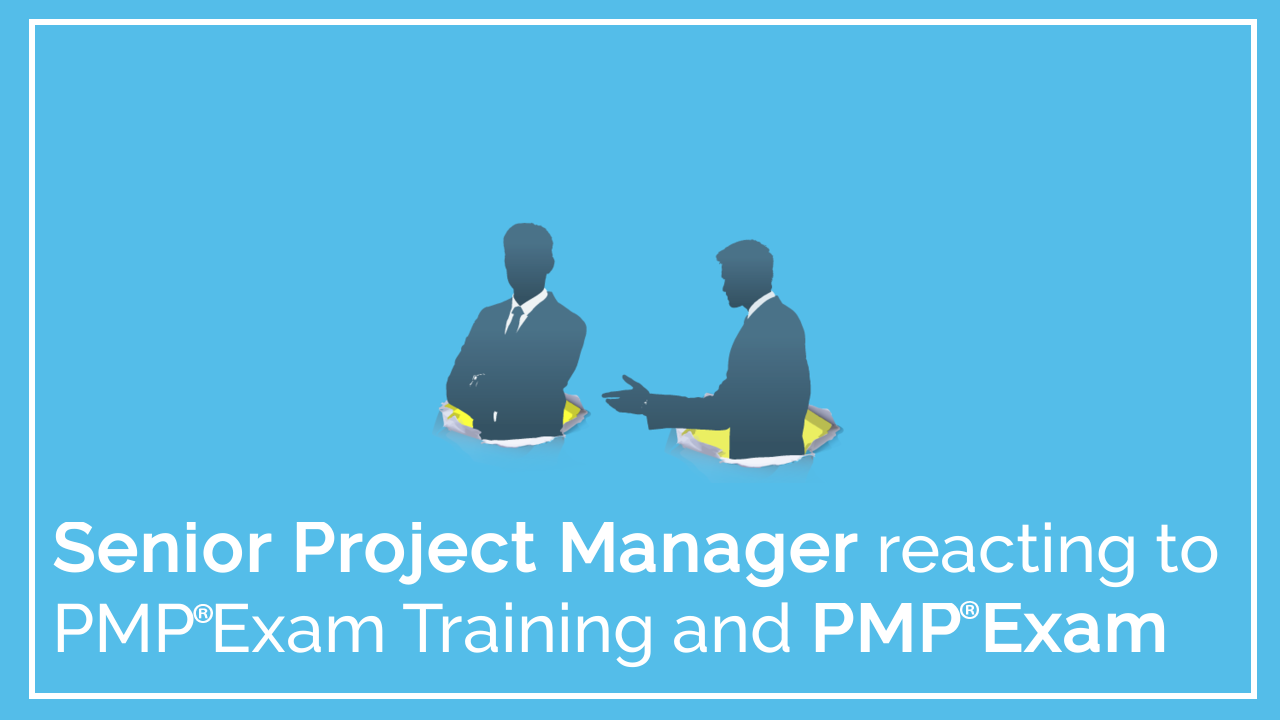My PMP Journey - Tim K

I decided that after many years of running projects, I was going to become PMP certified. My belief was that with all of my experience, achieving certification would be a relatively easy endeavor. Wrong!! Attending my PMP prep class, I quickly realized that my plan to utilize my previous job experience as the foundation for passing the exam, would lead to certain failure.
I determined that if I was to be successful in passing the exam, I needed to learn and to start thinking of project management according to the PMBOK standards. I committed to learning and understanding the material, and also focused on what approach to use to prepare and pass the exam.
There are so many suggested approaches to preparing for the PMP exam. How do you determine what is the best method to select? Understanding that my preferred learning style is a blend of visual, verbal, and social learning helped me identify and select education components that would facilitate my exam preparation.
After evaluating ...
PMP® Process of the day - Develop the Project Charter (4.1)

The project charter is a crucial element to your project. A properly created one saves time, energy and resources during the lifespan of your project.
Definition: The Project Charter is a formal document, usually written by the project sponsor or project initiator such as a buyer, that authorizes the project and gives the project manager authority to start. It is the first step in the initiating group that contains targets, wishes and constraints.
Where it is found:
· Part of the Initiating Process Group
· Free Standing process (not a parent or child)
· In the Knowledge area: Project Integration Management
Inputs: The project sponsor collects information from current high-level research, previous projects, project manager input or PMO office to outline the restraints, success criteria and high level- milestones from documents that include some or all the following items:
· Business Case
· Agreements and/or Contract (if applicable)
· ...
PMP® Study - Self-Direct vs. Team Approach

The road leading towards a PMI certification is filled with good intentions: working with a tutor, working with only one curriculum or simply going ahead by themselves. In my experience, there are two types of people: The Self-Directed individual and the Team-Approach member.
Self-Directed:
The Self-directed person gravitates to the idea of flexibility in the location, time and available materials. However, the reality can be time lost because this person looks for study materials, phone apps, and self-improvement quizzes. One person told me they had researched for six months before they were “ready”.
Team Approach:
The team approach connects working together to understand, articulate and apply the concepts. This option provides accountability, direction and subject matter expert access – an effective time management resource.
The PMI exam is expensive and will require a plan of action to be successful. But let me leave you with this thought: One approach over another is not inh...
How to Complete a PMI® – PMP® Application

How to Complete a PMI® – PMP® Application
So, you are ready to fill out the application – that is great! The Project Management Experience and Project Management Education sections can be the most time-consuming parts of the application are in. Both require a large amount of data entry and descriptive writing. It took me a few days to collect the information and about four hours to put into the application. I have customized a spreadsheet for my students to copy and paste the information into the online application.
Project Management Experience:
In this section, the application is looking for project specific information. Here is a brief outline of the subject matter that you need to complete this section. This is where you need to sit down with your resume knowledge of the projects you worked on and really document the hours you worked on each project.
· Project Name
· Project Dates
· Your Role
· Industry
· Your Company’s Profile
· T...
The 5 things you need to know to sign up for the PMP® exam

If you are reading this, there is a good chance that you have already met the Project Management Institute (PMI®) eligibility requirements for the Project Management Professional exam. This entry outlines the PMI® steps to schedule your exam. If you have any questions concerning the process, click on the active links for more information about the process or contact me!
Step 1. If you haven’t already, create an account on the PMI® website.
Step 2: Apply for the PMP® Credential on the PMI® website.
Step 3: Wait for PMI® to review your application and send you next steps (candidate number or audit procedure) – this usually takes 5- 10 business days.
Step 4: Pay for the test on the PMI® website. (PMI® members can save up to $150 on the exam.)
Step 5: Schedule your Project Management exam on the Prometric website.
While you are using the PMI® website to schedule your exam, you don’t have to be a paying PMI® member to gain your certification. As you start your application process, ple...
How long does it take to prepare for the PMP Exam?

You know, I have seen some PMP® ‘experts’ out there that give a strong recommendation that you will need to allocate no less than six months to prepare for the PMP® exam. These are big companies with reputable training materials - and a respectable number of customers. Then there are others who offer 4-day boot camps where they will supposedly have you ready to take the PMP® exam after four days.
How are these recommendations so far apart? I know from experience that the truth lies somewhere in between.
A 4-day course is going to cram too much material in a too-short amount of time. Sure, they may present all the material over four days, but it will still be up to you to take it home, digest and learn it.
On the other hand, six months is a long time - there is a too big risk a student could eventually fade off from their study routine. Then you’re back in the same boat - cramming at the end, frantically trying to sort through material.
My coaching programs range usually between...
PMBOK® Guide 6th Edition vs PMBOK® Guide 5th Edition: What has Changed in the PMP® Exam?

The Project Management Institute performs a role delineation study every five to seven years. The study focuses on what a project manager does day-to-day and relates this to the qualification. The recent RDS has revealed that the role of a project manager has slightly changed and so, the PMI® is releasing PMBOK® Guide 6th edition that reflects the new changes in the 3rd quarter of 2017.
It is worth noting that American National Standards Institute (ANSI) recognizes PMBOK® Guide is recognized as an American National Standard. This article will focus on the how the PMBOK® Guide 6 is different from the PMBOK® Guide 5 (current version).
The PMBOK® Guide 6th Edition is currently a work in progress. The first draft of this edition was released in March 2016 for feedback and comments. Note that the PMP® Exam will be updated in the first quarter of 2018 and it will be based on the PMBOKGuide 6.
What has Changed in PMBOK® Guide 6?

Here are the changes you should expect in the PMBOK® Guide...
The experienced PM meets the PMP®

In the years that I have been helping people pass the PMP® exam, I have come across a small number of seasoned Project Managers that were unable to pass the exam. More often than not, these people were either referred to me or reached out to me because they had recently failed the PMP® exam and didn’t know where they had gone wrong. The typical profile of this person was someone who was a savvy PM, who had maybe between 10 and 20 years’ experience running projects. For many of these folks it seemed completely meaningless that they should have to, at this point in their career, have this career-blocking exam placed in front them. They’d been successfully running projects for decades, and couldn’t understand why they needed the exam, or why it was proving so difficult to pass.
The truth is, the PMP® exam has become a de facto standard — globally — for Project Managers, and in most industries it’s accepted as a standard bearer for the things a PM should know when running a project. Many ...
The 5 Things that an organization gains when they hire a PMP® certified Project Manager

The Project Management Professional (PMP®) exam provides the successful candidate with a very valuable certificate stating they are PMP® certified – oh – any they also get a lapel pin from PMI®. Those are the two tangible things that the successful PMP® aspirant gets and I think it’s safe to say that one is really important and the other is well, a lapel pin. What about the other side of this equation? What about the employers? You know these are the organizations that shell out handsome salaries to these freshly minted PMP®s and what do they get for it? Many arguments can be made for all the value that a resource like PMP® brings to an organization but I have spent some time mulling my 20 years’ experience in corporate America and I think the PMP®s value to a company boils down to the following 5 things:
1. You know they have been trained – The first requirement The Project Management Institute (PMI®) makes the student aware of when they begin applying to the exam is that they must h...


